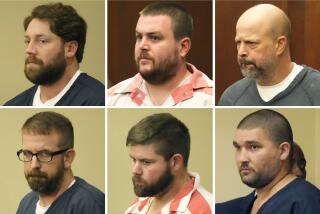Helping to Repair Credibility : De Klerk cracks down on police thugs
- Share via
South Africa has a sordid history of police abuse, brutality and harassment. For decades, police misconduct has gone unpunished despite thousands of allegations of beatings, torture and murders. Few black victims have made formal complaints in a nation where by law they had no rights--and where whites had automatically been right.
Now, in the atmosphere of irreversible reform, some members of the nation’s security and police forces may no longer go unchallenged or unpunished.
South African authorities have charged six police officers with murder in the deaths of 11 blacks stemming from a police raid three years ago in the Natal province. A trial is expected to start next month. Eighteen officers have also been suspended under suspicion of misconduct.
Investigations by the police and the African National Congress prompted the charges. This new attention to citizen complaints may help restore the credibility of President Frederik W. de Klerk.
His reputation suffered with the July revelations that government funds were covertly funneled by the security police to the Inkatha Freedom Party. That Zulu-based party, led by the politically conservative Chief Mangosuthu Gatsha Buthelezi, has been locked in a deadly rivalry with supporters of the ANC, the dominant anti-apartheid group.
ANC leaders have long complained of being targeted by security forces. Those complaints were dismissed in the past, but no more. Authorities are investigating the murders of several ANC members and other instances of political violence.
In fact, 11 of the suspended police officers had worked at a controversial political unrest investigation unit near Johannesburg. The Welverdiend interrogation rooms, which had become known as a “torture camp,” were finally closed in July--but not before a dozen black teen-agers told Times foreign correspondent Scott Kraft that they had been blindfolded, given electric shocks and beaten by officers assigned to that unit.
Two of the youths who talked to Kraft later died during police questioning. They were severely beaten by police officers, who blamed their deaths on epileptic seizures. Neither youngster had a history of epilepsy, and independent autopsies substantiated the beatings. A 15-year-old witness--who described the beatings to The Times--was shot to death by police during a so-called escape attempt.
Bloody police repression by security forces armed with guns, whips and tear gas is part of the history of South Africa. The tragic incidents are legion from Sharpeville in 1960 to Soweto in 1988 to the Welverdiend torture camp in 1990.
Old habits die hard. But the murder charges and suspensions of police officers are another important step toward justice for all South Africans.
More to Read
Sign up for Essential California
The most important California stories and recommendations in your inbox every morning.
You may occasionally receive promotional content from the Los Angeles Times.













